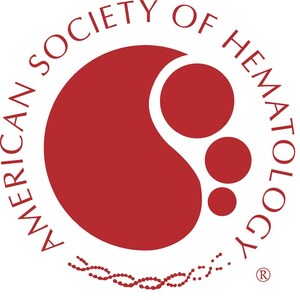WASHINGTON, Dec. 20, 2018 /PRNewswire/ -- The editors of Blood, the most-cited journal in hematology, have selected the top manuscripts of 2018.
"These 10 publications were chosen from the rich variety of top studies that appeared in the journal in 2018," said Blood Editor-in-Chief Bob Löwenberg, MD, PhD. "These articles offer a representative sampling of the notable advances of scientific and clinical knowledge in virtually every domain in the field of hematology."
The following manuscripts were selected by Dr. Löwenberg and Blood Deputy Editor Nancy Berliner. The editors' also provided comments on each study:
Blinatumomab for minimal residual disease in adults with B-cell precursor acute lymphoblastic leukemia, Gökbuget et al.
This study reports high rates of response (78%) and prolonged survival with blinatumomab immunotherapy for adults with minimal residual disease–positive precursor B-cell acute lymphoblastic leukemia.
Anti-CD37 chimeric antigen receptor T cells are active against B- and T-cell lymphomas, Scarfò et al.
These preclinical studies support the use of CD37 as a target antigen for novel chimeric antigen receptor T-cell reagents. They demonstrate activity against B- and T-cell lymphomas both by single-antigen targeting and by dual-specific therapy in combination with anti-CD19.
Circulating tumor DNA reveals genetics, clonal evolution, and residual disease in classical Hodgkin lymphoma, Spina et al.
and
Pervasive mutations of JAK-STAT pathway genes in classical Hodgkin lymphoma, Tiacci et al
These two papers elucidate the molecular landscape of classical Hodgkin lymphoma (cHL). The first study demonstrates that circulating tumor DNA (ctDNA) can be used to assess the genetics of cHL and to track residual disease. The second study uses microdissection and single-cell sequencing to establish the importance of JAK-STAT pathway genes in cHL, an observation that is mirrored in the ctDNA study.
Clinical spectrum of pyruvate kinase deficiency: data from the Pyruvate Kinase Deficiency Natural History Study, Grace et al.
This retrospective study of 254 patients provides a comprehensive overview of the clinical spectrum of pyruvate kinase deficiency (PKD) and elucidates the broad range of the clinical severity of PKD and characterizes the complex genotype-phenotype relationship of the disease.
First-in-human phase 1 clinical study of the IL-15 superagonist complex ALT-803 to treat relapse after transplantation, Romee et al.
The authors report the results of the first-in-human clinical trial of a novel interleukin-15 (IL-15) fusion protein to promote graft-versus-leukemia without enhancing graft-versus-host disease in patients with hematologic malignancies who relapsed after allogeneic stem cell transplantation.
Oral Bruton tyrosine kinase inhibitors selectively block atherosclerotic plaque–triggered thrombus formation in humans, Busygina et al.
These investigations demonstrate that ibrutinib selectively and irreversibly inhibits platelet aggregation on atherosclerotic plaques, suggesting a novel use of low-dose Bruton tyrosine kinase inhibitors in the prevention of progression of atherosclerosis.
Intravenous immunoglobulin vs observation in childhood immune thrombocytopenia: a randomized controlled trial, Heitink-Pollé et al.
This paper presents the long-awaited results of the randomized, controlled trial comparing intravenous immunoglobulin with observation in children with immune thrombocytopenia (ITP) at diagnosis, and it reports the frequency of chronic ITP in treated and untreated children.
This study provides evidence that mutations of the serine-threonine phosphatase gene PPM1D confer a selective growth advantage in the presence of ongoing DNA damage. It further demonstrates that pharmacological targeting of PPM1D can reverse this effect.
Rivaroxaban vs warfarin in high-risk patients with antiphospholipid syndrome, Pengo et al.
The investigators demonstrate that rivaroxaban is inferior to warfarin for the prevention of thromboembolic events, major bleeding, and vascular death in patients with high-risk antiphospholipid antibody syndrome in a randomized, multicenter, controlled study.
Aged murine hematopoietic stem cells drive aging-associated immune remodeling, Leins et al.
These investigations show how much the decline of immune function associated with aging is cell intrinsic and how much reflects declining thymic function. In a series of studies in transgenic mice, they demonstrate that functional aging primarily reflects hematopoietic stem cell aging and is independent of thymic function.
Blood (www.bloodjournal.org), the most cited peer-reviewed publication in the field of hematology, is available weekly in print and online. Blood is the flagship journal of the American Society of Hematology (ASH) (www.hematology.org), the world's largest professional society concerned with the causes and treatment of blood disorders.
ASH's mission is to further the understanding, diagnosis, treatment, and prevention of disorders affecting blood, bone marrow, and the immunologic, hemostatic, and vascular systems by promoting research, clinical care, education, training, and advocacy in hematology.
blood® is a registered trademark of the American Society of Hematology.
SOURCE American Society of Hematology
Related Links
WANT YOUR COMPANY'S NEWS FEATURED ON PRNEWSWIRE.COM?
Newsrooms &
Influencers
Digital Media
Outlets
Journalists
Opted In





Share this article